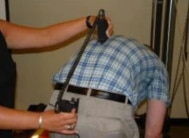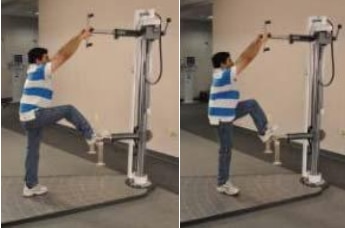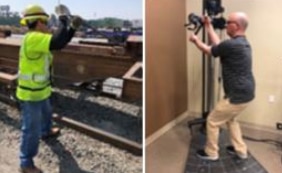PHYSICAL ABILITIES TEST
TIE DOWN CLERK
-

Lumbar Range of Motion Flexion/Extension
The physical abilities test starts with a lumbar range of motion measurement. This is used as a flexibility benchmark before the test. The applicant is asked to bend forward, backward and to each side while this measurement is taken.
-

Lumbar Range of Motion Flexion/Extension
The physical abilities test starts with a lumbar range of motion measurement. This is used as a flexibility benchmark before the test. The applicant is asked to bend forward, backward and to each side while this measurement is taken.
-

Step Up
Utilizing the handles and two different kinds of hand grips, Tie Down Clerk applicants must demonstrate the ability to step up onto a step from each of their feet, just as they would to get onto a train.
-

Step Up
Utilizing the handles and two different kinds of hand grips, Tie Down Clerk applicants must demonstrate the ability to step up onto a step from each of their feet, just as they would to get onto a train.
-

Bilateral Pedestal
Pull Employees are sometimes required to flip pedestal covers, which requires squatting down and pulling up on a weighted object. For this physical task, applicants must demonstrate the ability to crouch down and pull upward on the handle of an apparatus with both hands individually.
-

Bilateral Pedestal
Pull Employees are sometimes required to flip pedestal covers, which requires squatting down and pulling up on a weighted object. For this physical task, applicants must demonstrate the ability to crouch down and pull upward on the handle of an apparatus with both hands individually.
-

Long Bar Pull
Tie Down Clerks must occasionally pull on a long bar in order to drop a trailer hitch. Applicants must demonstrate the ability to apply sufficient force to the long bar by pulling against the handles.
-

Long Bar Pull
Tie Down Clerks must occasionally pull on a long bar in order to drop a trailer hitch. Applicants must demonstrate the ability to apply sufficient force to the long bar by pulling against the handles.
-

Long Bar Pull
Tie Down Clerks must occasionally pull on a long bar in order to drop a trailer hitch. Applicants must demonstrate the ability to apply sufficient force to the long bar by pulling against the handles.
-

Long Bar Pull
Tie Down Clerks must occasionally pull on a long bar in order to drop a trailer hitch. Applicants must demonstrate the ability to apply sufficient force to the long bar by pulling against the handles.
-

Dynamic Carry
Tie Down Clerk applicants must be able to carry and place equipment including inter-box connectors. Applicants must demonstrate the ability to carry a weighted crate from a shelf to a designated point and return it back to the shelf.
-

Dynamic Carry
Tie Down Clerk applicants must be able to carry and place equipment including inter-box connectors. Applicants must demonstrate the ability to carry a weighted crate from a shelf to a designated point and return it back to the shelf.
-
Side Step Place IBC Bilateral
Tie Down Clerks must be able to stoop and balance while holding the inter-box connector (IBC) in one hand. Applicants must demonstrate this ability through picking up the IBC, side stepping across a balance apparatus, and handing the IBC off to the clinician.
-
Side Step Place IBC Bilateral
Tie Down Clerks must be able to stoop and balance while holding the inter-box connector (IBC) in one hand. Applicants must demonstrate this ability through picking up the IBC, side stepping across a balance apparatus, and handing the IBC off to the clinician.
-
Upper Level Reach
Tie Down Clerks may have to work while extending their arms above shoulder height, such as when they must climb to access equipment or place IBCs. Applicants must demonstrate this reaching ability by transferring pegs from the bottom to the top of a panel.
-
Upper Level Reach
Tie Down Clerks may have to work while extending their arms above shoulder height, such as when they must climb to access equipment or place IBCs. Applicants must demonstrate this reaching ability by transferring pegs from the bottom to the top of a panel.
-
Stooping Reach
Tie Down Clerks must be able to stoop to low levels while lifting and placing inter-box connectors (IBCs) and other equipment. Applicants must demonstrate this ability by moving from a standing position to a stooping position and moving pegs from the top of a panel to the bottom.
-
Stooping Reach
Tie Down Clerks must be able to stoop to low levels while lifting and placing inter-box connectors (IBCs) and other equipment. Applicants must demonstrate this ability by moving from a standing position to a stooping position and moving pegs from the top of a panel to the bottom.





